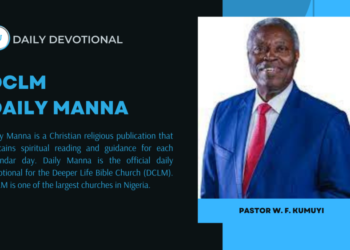ESOCS Devotional 9 November 2022
TEXT: JOB 29:11-16
MEMORY VERSE: “When the ear heard, then it blessed me, and when the eye saw, then it approved me.” Job 29:11
0 And the apostles, when they had returned, told Him all that they had done. Then He took them and went aside privately into a deserted place belonging to the city called Bethsaida. 11 But when the multitudes knew it, they followed Him; and He received them and spoke to them about the kingdom of God, and healed those who had need of healing. 12 When the day began to wear away, the twelve came and said to Him, “Send the multitude away, that they may go into the surrounding towns and country, and lodge and get provisions; for we are in a deserted lace ”
In the verses of our text, we find the man Job giving details of his good works towards others. He was honest about himself; like Hezekiah who gave God the details of his good works and God added fifteen years to his life span (2 Kings 20:1-5). Job was a virtuous man who was filled with Christian piety and benevolence and charity. He attended to the plight of others with passion; and did not give his soul rest until the oppressed and afflicted are set free and delivered. In verses 12 and 17, he said, “I delivered the poor who cried out, the fatherless and the one who had no helper … I broke the fangs of the wicked, and plucked the victim from his teeth.” He summed it up in verse 14: “… My justice was like a robe and a turban.” It would take a man who has a deep sense for justice to fight injustice perpetuated against others. This attitude was like a culture deep in him. He was not born with it; he developed it, and practised it.
He was also fantastic in philanthropy. He said, “I caused the widow’s heart to sing for joy” (v13); and “I was a father to the poor” (v 16). The blind didn’t need a better guide and the lame didn’t crave for a better support. Job was all they needed to make life comfortable (v 15). He was there for the weak, the helpless, the destitute, the indigent, and many others. He gave them succour, and a hope for the future. He was so good at taking care of others in their times of distress that he said, “The blessing of a perishing man came upon me” (v 13). In other words, even the tongues and lips of people on their dying beds never ceased to recount his kind deeds and bless him. In his virtuous living, he said, “I put on righteousness, and it clothed me” (v 15); and in the desire to ensure that no aspect was neglected, he said, “And I searched out the case that I did not know” (v 16). What manner of man was he?
What testimony do people have concerning you? What testimony can you give about your works? Can anyone bear you witness that you are good to people? Do people thank God and rejoice for meeting you or for ever having anything to do with you in life? What kind of witness does God have about you? Do you bring glory to God by the things you do? How do you treat others? What manner of life do you live? Do you ever care when people are in need or distress? What have you contributed towards the wellbeing of humanity? Can the poor and needy recount before God any works of charity that you have done to them? (Acts 9:36-42).
Let us remember that as Christians part of our obligations is to contribute meaningfully to the good of others. This is one of the essential marks of Christian piety. For Christ Jesus our Lord left heaven and came down into the world with one over-riding purpose: to seek our good so that that name of the Father would be glorified. Let us do likewise.
CHALLENGES
- Map out a strategy for identifying the needs of others and helping them.
PRAYERS: Pray that the Spirit of Christ may dwell richly in you.
Read Yesterday’s ESOCS Devotional here
Thank you for reading the ESOCS Devotional today. Please share and follow us on all our platforms to contribute to the spread of the Gospel.
ESOCS Devotional 9 November 2022















